Depression in the News
Friends, family members, even celebrities can all suffer from depression. It is a common mental health condition that affects nearly 10% of people in the United States. It is a treatable medical condition, not a personal weakness. If left untreated it can lead to other health problems and if severe enough, even suicide.
Depression can be caused by many different things. Some people are grieving over the loss of a loved one or a major life change. Others have physical or other emotional problems contributing to depression. Side effects of medication can also be to blame. Depression seems to run in families. The symptoms include sadness, hopelessness, irritability, feelings of guilt, crying spells, trouble sleeping and/or eating, inability to feel joy, loss of interest in things that used to bring happiness which can include hobbies, family or even sex.
People who do not understand depression think it is a “weakness” that the person just needs to “get over.” It is not a weakness. Treatment through counseling can be extremely helpful. Sometimes anti-depressants are also added to the treatment plan. Generally, the combination of both, talk therapy and medication are the winning combination for many people to help lift them from their depressive states. If someone is suicidal, take that person to the emergency room immediately. People can also access the EAP to be screened for depression and get connected to the right treatment providers for them. There are many things that can be done to help people who are suffering from depression so they can lead happy, productive lives.
Is a Loved One Gaming Too Much?
Internet Gaming can be Addictive
Do you have a young adult in your family who seems abnormally connected to the computer? Did you know that people can exhibit addictive behaviors to things like gambling, internet gaming, shopping, and even food? These are called Process Addictions. Just like substance abuse addictions (alcohol, drugs) it often starts out innocently enough but then certain people go further and further, “ingesting” more and more of the “substance.”
There is a neurotransmitter in the brain called dopamine. Dopamine makes a person feel good. Years of research have determined that drugs, alcohol, gambling, sex, eating, and gaming involve changes in dopamine. The person becomes addicted to the “hits” of dopamine they receive through the behavior. They may try and cut back, only to fail and then end up increasing the time on the computer, or in the gaming, or in the drinking. A person with an internet gaming addiction can exhibit withdrawal symptoms similar to those who try and stop using drugs or alcohol. The person could experience increased anxiety, anger, depression, irritability and social isolation.
“But, at least he’s not drinking!” We often hear that from parents. Many people play games on the computer. So, if you have a “computer person” in your family, how do you know if there is a problem? Ask yourself these questions: Does there seem to be a compulsive pattern to the gaming? Does the person have balance in his life? In other words, does the gaming behavior seem to interfere with one or more major spheres of his life: relationships, work, academic performance, health, finances or legal status?
There are people you can talk to about your concerns. There are many resources on the internet, of course. there is even an On-Line Gamers Anonymous (www.olganon.org). For help with a gambling problem, go to www.baltimoregambler.org. Of course, you can always make an appointment with an EAP counselor to discuss concerns about yourself or family members. Call 410.328.5860 to schedule an appointment.
Is a Loved One Gaming Too Much?
Internet Gaming can be Addictive
Do you have a young adult in your family who seems abnormally connected to the computer? Did you know that people can exhibit addictive behaviors to things like gambling, internet gaming, shopping, and even food? These are called Process Addictions. Just like substance abuse addictions (alcohol, drugs) it often starts out innocently enough but then certain people go further and further, “ingesting” more and more of the “substance.”
There is a neurotransmitter in the brain called dopamine. Dopamine makes a person feel good. Years of research have determined that drugs, alcohol, gambling, sex, eating, and gaming involve changes in dopamine. The person becomes addicted to the “hits” of dopamine they receive through the behavior. They may try and cut back, only to fail and then end up increasing the time on the computer, or in the gaming, or in the drinking. A person with an internet gaming addiction can exhibit withdrawal symptoms similar to those who try and stop using drugs or alcohol. The person could experience increased anxiety, anger, depression, irritability and social isolation.
“But, at least he’s not drinking!” We often hear that from parents. Many people play games on the computer. So, if you have a “computer person” in your family, how do you know if there is a problem? Ask yourself these questions: Does there seem to be a compulsive pattern to the gaming? Does the person have balance in his life? In other words, does the gaming behavior seem to interfere with one or more major spheres of his life: relationships, work, academic performance, health, finances or legal status?
There are people you can talk to about your concerns. There are many resources on the internet, of course. there is even an On-Line Gamers Anonymous (www.olganon.org). For help with a gambling problem, go to www.baltimoregambler.org. Of course, you can always make an appointment with an EAP counselor to discuss concerns about yourself or family members. Call 410.328.5860 to schedule an appointment.
Why Do You Worry All the Time?
Wait to Worry is the advice Steven Petrow dispenses in his article in the Washington Post on May 27, 2014. Mr. Petrow references his father and himself as worriers who thought too much about the “What ifs” of the future. However, Mr. Petrow decided to break his habit of overindulging in worry. He replaced it with some guided meditation which he practiced for 10 minutes three times a day. He said after a few weeks of this he was able to regain “a sense of self-mastery, and with it a certain peace. I grew less afraid of the what-ifs and stopped dwelling on them-and started to enjoy the right-now again.” Mr. Petrow said he adopted the mantra “Wait to Worry.”
It is a well known fact that people who stay focused on the present are happier than those who ruminate about the past, or worry about the future. Enjoy yourself today!
For help in getting yourself to your happy place, contact the EAP and have one of our counselors assist you.
Why Do You Worry All the Time?
Wait to Worry is the advice Steven Petrow dispenses in his article in the Washington Post on May 27, 2014. Mr. Petrow references his father and himself as worriers who thought too much about the “What ifs” of the future. However, Mr. Petrow decided to break his habit of overindulging in worry. He replaced it with some guided meditation which he practiced for 10 minutes three times a day. He said after a few weeks of this he was able to regain “a sense of self-mastery, and with it a certain peace. I grew less afraid of the what-ifs and stopped dwelling on them-and started to enjoy the right-now again.” Mr. Petrow said he adopted the mantra “Wait to Worry.”
It is a well known fact that people who stay focused on the present are happier than those who ruminate about the past, or worry about the future. Enjoy yourself today!
For help in getting yourself to your happy place, contact the EAP and have one of our counselors assist you.
Free Depression and Anxiety Screening
May 9th, lunchtime: Depression and Anxiety Screening
The confidential screening will be held 11:00-2:00 p.m. in Room 210 of the Professional Building, 419 West Redwood Street, for all employees. Counselors will be on hand and the screening will take 10-15 minutes. Free lunch will be provided and each person will be entered into a raffle to win a gift certificate at a local restaurant. If you have questions, please contact Monique Church, LCSW-C in the EAP at 410.328.5860.
EAP Open House – A Big Success!
The EAP’s first Open House was a wonderful success. We want to thank the over 125 employees who attended our Open House. While visiting the EAP, employees met staff members, learned about relaxation techniques and about neurofeedback. They also received a free lunch and prizes. The supervisor with the most staff who attended the Open House received a relaxation spa basket. The supervisor who won was Elaine Madison from the OB-GYN practice. Every employee had the chance to win the raffle for a Kindle Fire. The winner of the drawing was Linda Astorita, also from the OB-GYN practice. The EAP staff wants to thank all who came to the Open House. We hope that when you find the need for our services, you will be more likely to contact us, now that you know us a little bit better.

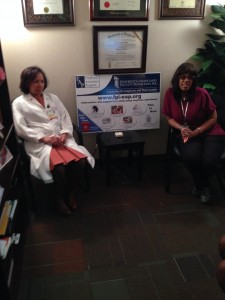
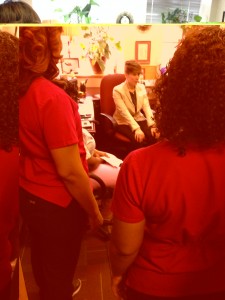
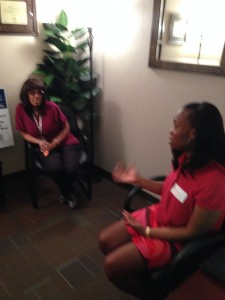
>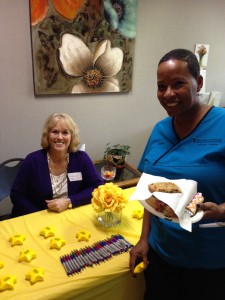

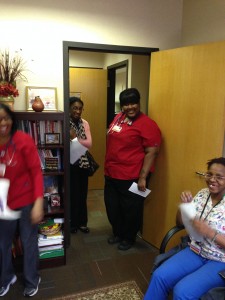
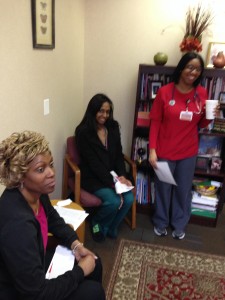
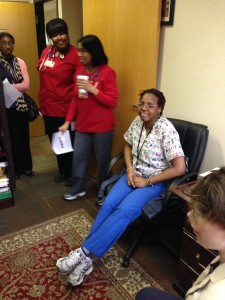
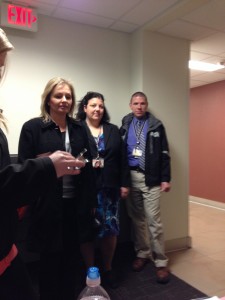
Recharge Your Battery in 15 minutes
New Year’s Resolution 2012: “I’m going to start taking better care of myself.”
New Year’s Resolution 2013: “I am REALLY going to take better care of myself.”
New Years’ Resolution 2014: “This year for SURE. I promise to take better care of myself.”
Let us help you achieve your promise to yourself. Give us 15 minutes a week. We will help you learn to de-stress, calm down, and be kinder to yourself.
The Employee Assistance Program (EAP) is offering a 15-minute instruction on how you can begin to take care of yourself. Every Tuesday in the EAP suite 560, from 12:15-12:30, Bridget Mixon, LGSW, will show you how you can feel better in 15 minutes.
February 4, 2014, a snack will be provided during the 15 minutes of Calm this week
February 11, 2014, a new technique will be introduced.
February 18, 2014, a different de-stressing activity will be taught
February 25, 2014, the final skill of the month will be shown to you.
In March, we will repeat the techniques again, so you can come and participate, fine tune what you already learned, bring your coworkers, or just use the time with us to force yourself to take a breath!
For more information, please call the EAP at 8-5860, or email Maureen at mmccarre@psych.umaryland.edu.
Recharge Your Battery in 15 minutes
New Year’s Resolution 2012: “I’m going to start taking better care of myself.”
New Year’s Resolution 2013: “I am REALLY going to take better care of myself.”
New Years’ Resolution 2014: “This year for SURE. I promise to take better care of myself.”
Let us help you achieve your promise to yourself. Give us 15 minutes a week. We will help you learn to de-stress, calm down, and be kinder to yourself.
The Employee Assistance Program (EAP) is offering a 15-minute instruction on how you can begin to take care of yourself. Every Tuesday in the EAP suite 560, from 12:15-12:30, Bridget Mixon, LGSW, will show you how you can feel better in 15 minutes.
February 4, 2014, a snack will be provided during the 15 minutes of Calm this week
February 11, 2014, a new technique will be introduced.
February 18, 2014, a different de-stressing activity will be taught
February 25, 2014, the final skill of the month will be shown to you.
In March, we will repeat the techniques again, so you can come and participate, fine tune what you already learned, bring your coworkers, or just use the time with us to force yourself to take a breath!
For more information, please call the EAP at 8-5860, or email Maureen at mmccarre@psych.umaryland.edu.
Tune Up Your Relationship
Let the EAP help you and your partner
Does your relationship need a tune up?” If you are unsure, ask yourself the following questions;
- Do you have the intimacy you’ve always desired?
- Is undivided attention something you give and receive daily?
- Do you and your significant other date regularly?
- Is the communication in your relationship clear, caring, complete and continuous?
Don’t be surprised if you are unable to answer “yes” to all questions. Though we often have the best of intentions, managing careers, children, family obligations and activities of daily life create challenges to making relationships a priority.
Just like vehicles need regular maintenance to run smoothly, relationships also need routine care to stay vigorous. The EAP provides short- term, couples’ counseling to assist you in returning your union to a positive path or helping your bond stay strong. Call the Employee Assistance Program at 410-328-5860 today and schedule an appointment with Sue Walker, Wanda Binns, Maureen McCarren or Monique Church. Whether you have been committed twelve months or forty years, every relationship needs a tune up.
 Click to Call
Click to Call
